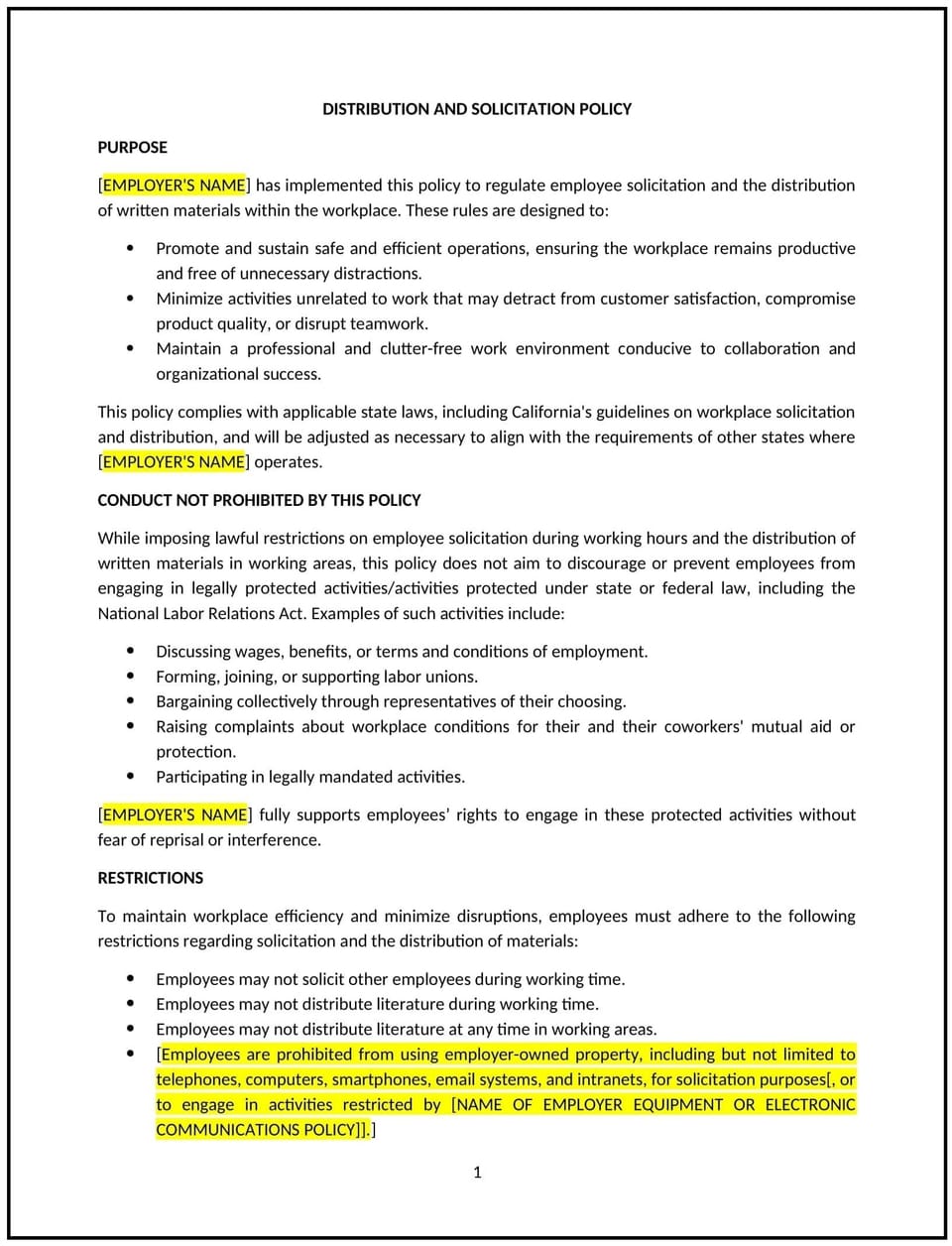Distribution and solicitation policy (California): Free template

Distribution and solicitation policy (California)
In California, a distribution and solicitation policy provides businesses with guidelines for managing activities such as the distribution of materials or solicitation of goods, services, or donations in the workplace. This policy helps maintain a productive work environment while supporting compliance with California labor laws.
This policy outlines permissible activities, restrictions, and procedures for obtaining approval for solicitation or distribution. By implementing this policy, California businesses can minimize workplace disruptions and ensure fair and consistent enforcement.
How to use this distribution and solicitation policy (California)
- Define permitted activities: Specify the types of solicitation or distribution allowed, such as charitable fundraising approved by the business, and clarify prohibited activities.
- Identify restricted areas: Outline where solicitation and distribution are not allowed, such as workstations, production areas, or during work hours.
- Establish approval procedures: Provide steps for employees or third parties to request permission for solicitation or distribution activities.
- Communicate expectations: Ensure employees understand the policy’s intent and the importance of minimizing workplace disruptions.
- Apply consistently: Enforce the policy uniformly to avoid perceptions of favoritism or discrimination.
Benefits of using this distribution and solicitation policy (California)
This policy offers several advantages for California businesses:
- Supports compliance: Reflects California labor laws and ensures lawful management of solicitation and distribution activities.
- Maintains productivity: Minimizes workplace interruptions caused by unauthorized activities.
- Promotes fairness: Ensures all employees are treated consistently under the policy.
- Protects employees: Creates a work environment free from unwanted solicitations or distributions.
- Reduces risks: Prevents potential disputes or claims related to unfair enforcement of rules.
Tips for using this distribution and solicitation policy (California)
- Address California-specific considerations: Reflect state laws governing employee rights to solicit during non-working hours or in non-work areas.
- Train managers: Provide guidance on enforcing the policy fairly and handling requests for exceptions or approvals.
- Use clear communication: Regularly remind employees of the policy to ensure awareness and understanding.
- Document approvals: Keep records of authorized activities to maintain transparency and accountability.
- Review regularly: Update the policy to reflect changes in California laws or workplace practices.
Q: How does this policy benefit the business?
A: This policy helps maintain productivity, supports compliance with California laws, and ensures a fair approach to solicitation and distribution in the workplace.
Q: What activities are restricted under this policy?
A: Prohibited activities may include distributing materials or soliciting goods, services, or donations during work hours or in work areas, unless explicitly approved.
Q: How does this policy support compliance with California laws?
A: The policy reflects California labor laws, supporting lawful management of workplace solicitation and distribution activities.
Q: What steps should employees take to request approval for an activity?
A: Employees should submit a formal request to HR or management, providing details about the proposed activity and its purpose.
Q: How can the business handle violations of this policy?
A: The business can follow the disciplinary procedures outlined in the policy, such as issuing warnings or corrective actions, to address non-compliance.
This article contains general legal information and does not contain legal advice. Cobrief is not a law firm or a substitute for an attorney or law firm. The law is complex and changes often. For legal advice, please ask a lawyer.


